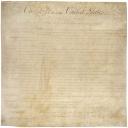Yahoo Answers is shutting down on May 4th, 2021 (Eastern Time) and the Yahoo Answers website is now in read-only mode. There will be no changes to other Yahoo properties or services, or your Yahoo account. You can find more information about the Yahoo Answers shutdown and how to download your data on this help page.
Trending News
Why do the atheists mistakenly state there is a separation of Church and State in the USA?
When in reality the Constitution ONLY states that there is to be no interference of churches by the state. The Constitution ONLY protects the people from the State. The State is the danger that the Constitution was written for. Christians wrote it. NO OTHER peoples have ever protected themselves from the state as the Christians have done here in the USA. That amendment is the FIRST amendment, btw. The various divisions of the Christians are therefore protected. Atheists are also marginally protected by the Constitution. And only by virtue of association with the Christian morality, the ten commandments, and the laws of the Bible.
Muslims are NOT protected by these laws. Muhammed was the very type of False Prophet that Jesus warned about. Ritual and prayers to a False Prophet do not a religion make. If not for the oil money, the Muslims would be regressing further and further into the past heading for the stone age.
sfguybry, well good then. Let the flag fly, let prayers be said, let us say the Pledge of Allegiance at our government meetings, leave the crosses in the hall of government, in God we Trust stays on the dollar bills, We swear an oath on the Bible to uphold the Constitution, we have manger scenes in town squares, the atheists can stfu about religion in schools, congress, knowing they have NO souls, are not CREATED in the image of God and they are not included in the God given Inalienable Rights of Life, Liberty, and the Pursuit of Happiness.
Atheists are just a collection of molecules on par with animals and plants. With no special higher purpose in life.
btw, it would be a relief to have the atheists stop interpreting the Bible for us also. Including your interpretation of Christian 'wealth'. You may not ever understand that that wealth is SPIRITUAL wealth. NOT material wealth. No material wealth will ever gain you entrance into heaven. It is likely beyond your comprehension,
7 Answers
- 1 decade agoFavorite Answer
Its a pragamistic intepretation of the Constitution.
Really I see it as cherry picking quotes, or phrases from speeches, arguments, writings, and even amendments and not presenting the full context of the argument or discussion. This is done soley to justify their agenda, vice present the intention of the fact. (This is a long way of saying twisting the facts).
From the Congressional Record in 1789 during the debate for Ratification of the first Amendment.
"Mr. [Peter] Sylvester [of New York] had some doubts. … He feared it [the First Amendment] might be thought to have a tendency to abolish religion altogether. … Mr. [Elbridge] Gerry [of Massachusetts] said it would read better if it was that “no religious doctrine shall be established
by law.”… Mr. [James] Madison [of Virginia] said he apprehended the meaning of the words to be, that “Congress should not establish a religion, and enforce the legal observation of it by law.”… [T]he States seemed to entertain an opinion that under the clause of the Constitution … it enabled
them [Congress] to make laws of such a nature as might … establish a national religion; to prevent these effects he presumed the amendment was intended … Mr. Madison thought if the word “national” was inserted before religion, it would satisfy the minds of honorable gentlemen. … He thought if the word “national” was introduced, it would point the amendment directly
to the object it was intended to prevent."
Virginia proposed an Amendment (Prior to the Bill of Rights) to read:
TWENTIETH, That religion or the duty which we
owe to our Creator, and the manner of
discharging it can be directed only by reason and
conviction, not by force or violence, and therefore
all men have an equal, natural and unalienable
right to the free exercise of religion according to
the dictates of conscience, and that no particular
religious sect or society ought to be favored or
established by Law in preference to others.
August 15, 1789 debates: (THIS IS THE ACTUAL DEBATE FROM THE ACTUAL FOUNDERS OF THE FIRST AMENDMENT!)
Article I. Sect 9. Between paragraph 2 & 3 insert
“no religion shall be established by law, nor shall
the equal rights of conscience be infringed.”
Mr. GERRY
Said it would read better if it was, that no religion
doctrine shall be established by law.
Mr. SHERMAN
Thought the amendment altogether unnecessary,
inasmuch as congress had no authority whatever
delegated to them by the constitution, to make
religious establishments, he would therefore move
to have it stuck out.
Mr. MADISON
Said he apprehended the meaning of the words to
be, that congress should not establish a religion,
and enforce the legal observation of it by law, nor
compel men to worship God in any manner
contrary to their conscience; whether the words
were necessary or not he did not mean to say, but
they had been required by some of the state
conventions, who seemed to entertain an opinion
that under the clause of the constitution, which
gave power to congress to make all laws
necessary and proper to carry into execution the
constitution, and the laws made under it, enabled
them to make laws of such a nature as might
infringe the rights of conscience, or establish
national religion, to prevent these effects he
presumed the amendment was intended, and he
thought it as well expressed as the nature of the
language would admit.
Mr. HUNTINGTON
Said that he feared with the gentleman first up on
this subject, that the words might be taken in
such a latitude as to be extremely hurtful to the
cause of religion: He understood the amendment
to mean what had been expressed by the
gentleman from Virginia, but others might find it
convenient to put another construction upon it.
The ministers of their congregations to the
eastward, were maintained by the contributions of
those who belonged to their society; the expence
of building meeting-houses was contributed in the
same manner, these things were regulated by bye
laws: If an action was brought before a federal
court on any of these cases, the person who had
neglected to perform his engagements could not
be compelled to do it; for a support of ministers,
or building of places of worship might be
construed into a religious establishment.
By the charter of Rhode-Island, no religion could
be established by law he could give a history of
the effects of such a regulation; indeed the people
were now enjoying the blessed fruits of it: He
hoped therefore the amendment would be made
in such a way as to secure the rights of
conscience, and a free exercise of the rights of
religion, BUT NOT TO PATRONIZE those who professed
no religion at all.
Mr. MADISON
Thought, if the word national was inserted before
religion, it would satisfy the minds of honorable
gentlemen. He believed that the people feared
one sect might obtain a pre-eminence, or two
combine together and establish a religion to which
they would compel others to conform; he thought
if the word national was introduced, it would point
the amendment directly to the object it was
intended to prevent.
Source(s): You can read the whole debate here. http://www.consource.org/index.asp?bid=530&groupid... Go to the "Bill of Rights Section" + Debates in the House of Representatives" The passage above is from "The Congressional register August 15, 1789" - Mujer AltaLv 71 decade ago
How 'bout because given all the historical evidence, there is a separation of church and state. Reading your question, I'm reminded of an old song: "Don't know much about history.....". The colonies in their later years and the states of the early U.S. were divided between two mainstream churches: The Congregationalists in the north and the Anglicans in the south. Citizens no matter what their religious affiliation were taxed to support the state churches. The theology, prayers, songs, etc. of these churches were taught in the schools. Needless to say, the Baptists, Presbyterians, Quakers, Catholics and Jews were none too pleased to be forced to support state churches that were not their own. The animosity between the members of the different churches was destabilizing at a time when the country needed all the stability it could get. In order to keep the peace and help hold the young country together, a bunch of really smart guys set the rule that there is church and there is state and they are separate things. A citizen's religious beliefs are their own individual and private concern. As Thomas Jefferson said: "What care I if my neighbor believe in one god, twenty gods or no god? It neither steals my purse nor breaks my leg."
It's too bad modern Americans can't keep their religious beliefs private and out of the public sphere. America would be better for it. It's also very sad that a neo-historical bag of lies is replacing the real and very exciting history of the U.S. - for instance, did you know the by refering to Natural Law in the Declaration of Independence the Founders were telling the King that they were as worthy under the law as kings? At the time the people were to follow and be bound by Common Law, by the laws of parliament and by the edicts of the king. Only kings were bound by Natural Law.
(btw, the Constitution was written to provide a functional structure for a new national government because under the Articles of Confederation the old government did not have the power to enforce payment of the taxes levied on the states to pay off the Revolutionary War debt. Go figure.... The Constitution was written because the feds needed to collect taxes to pay off a debt. ;-p)
Source(s): I've read the letters, speeches, legislation and most of the other papers of the Founders. - tfoley5000Lv 71 decade ago
Well the Freedom of Religion Protects Muslims and Jews so you are Wrong about them not having rights.
Separation of Church and Sate means Christianity is not the same Laws of Secularism which is Government.
Free Speech that's what protects Atheists and Agnostics Christians are really Kicked out of Government already and about the Bible I don't believe it and Jesus Christ Son of God No Way man, he ain't my Prophet Agree to Disagree fine Its Free Speech not hate Speech.
So leave the other Americans Not christians alone You kicked yourself out of Government don't blame us for it that's something you need to know.
- ?Lv 45 years ago
What the heck is an "atheiocratic?" I actually have a "issue" with movements that are risky interior the genuine international. those comprise putting your non secular ideals into regulation, yet it is a few distance from all. No, i do no longer elect "state atheism." i elect what the form ensures -- that the government would not propose or sell ANY faith. era. Peace.
- towwwdothelloLv 41 decade ago
Atheists do not mistakenly state there is a separation of Church and State.
There is a clear separation of church and State in the USA--and that is to keep each religion pure, in its own form and to maintain freedom from a publicly imposed form of religion.
Publicly imposed religion would be government imposed religion because the people make up the government.
- sfguybryanLv 61 decade ago
What do you think, and I put it in your exact words, "there is to be no interference of churches by the state" means? That is what we atheists mean when we say "separation of Church and State". Sounds like WE have the same idea!
- Buddy RLv 71 decade ago
In my opinion, atheists are not very interested in facts. They have their own dogma to push, and they preach it with fervor.
Jefferson's "wall of separation" letter to the ani-baptists was telling them that the governement was not going to but into their affairs. The founding fathers encouraged churches to influence governemnt and said that the Constitution was made for a moral people.






